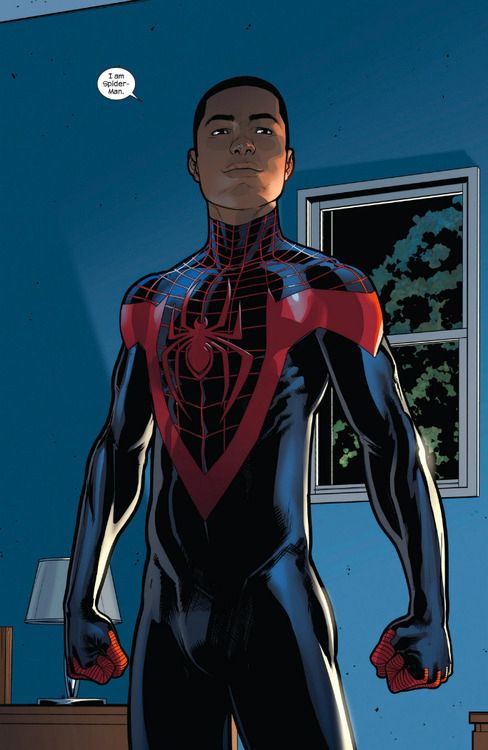If you're surprised by the above photo, you probably haven't read a comic book in a few years. That's Miles Morales, a mixed race teenager who, after the death (yeah, right) of Peter Parker, the original Spider-Man, has donned the mask of New York's friendly neighborhood web-slinger. He was supposed to be a continuation of the classic Spider-Man motif: that great power comes with responsibility. He's a superhero for a new generation, one where diversity and voice matters. But in recent issues, writer Brian Michael Bendis has dropped the ball on his responsibility that comes with his power as a writer: connecting to his audience.
The character of Spider-Man is a golden opportunity to continue this tradition of bringing liberal discourse to the mainstream. But what we get instead is this page, from Spider-Man No. 2:
Miles doesn't want to be "black" Spider-Man. He just wants to be Spider-Man. It's the same old "colorblind" rhetoric that erases his importance to fans of Spider-Man. In effect, Bendis is sidelining a character of color's racial identity in an attempt to be colorblind. The vlogger girl who gets excited about representation in superheroes is turned into an annoying caricature of a social justice warrior. Its a strategy which alienates fans of the hero, and pissing off your fans isn't a great idea.
Case in point, tweets by J.A. Micheline:
heads up white writers: don't write characters of color whose take is "I don't want to be defined by my race" do not.— J. A. Micheline (@elevenafter) March 2, 2016
Even if that is a feeling that some/many PoC have, think for a fucking second about the power dynamics involved in you doing that— J. A. Micheline (@elevenafter) March 2, 2016
From you, it reads like "why do people care so much about race?"— J. A. Micheline (@elevenafter) March 2, 2016
The erasure of Miles' racial identity eliminates a fundamental aspect of his character, one that makes him distinctly powerful and gives him potential not given to any other superhero. And we're not just talking about spider-sense.
Think for a second about what it means to be Miles Morales. To be a mixed race teenager of color during the Black Lives Matter Movement. During the police violence against young black men across the country. A teenager who lives in New York, a city which experiences unbelievable rates of stop and frisk. To be the target demographic of the War on Drugs. This is not a kid who claims to be Hispanic instead of Latino.
Miles Morales has every justification to be one of the most radical figures in comic book history. Someone who not only has pride in their culture and their identity, but whose actions reflect this. Miles Morales has absolutely no reason to go after drug dealers or bank robbers, and no reason to have even one iota of confidence in any police officer, or as people are so fond of reminding us, "the real heroes".
The thing is, if Spider-Man started defending people from cops and helping people fight poverty, I'm not so sure whatever laws of comic books that exist would still label him as a 'hero'. Such an anti-establishment stance would label him as a villain or at the very least an anti-hero. He'd be an 'other' in the superhero community, just as he is in his secret identity.
Bendis has stated that Miles' opinions in Spider-Man No. 2 aren't set in stone, leaving there much growth for his character and his stance as a POC icon. But the current way he is written, with complete disregard for his place in comic book culture, doesn't seem to echo the progressivism and openness to discourse that the superhero genre has espoused for decades.
So, with that in mind, I leave you with this quote from an essay called "The Negro Artist and the Racial Mountain", written by Langston Hughes in 1926, 86 years before Miles Morales donned the mask of the Spider-Man on the pages of a comic book:
" One of the most promising of the young Negro poets said to me once, 'I want to be a poet--not a Negro poet,' meaning, I believe, 'I want to write like a white poet'; meaning subconsciously, 'I would like to be a white poet'; meaning behind that, 'I would like to be white.' And I was sorry the young man said that, for no great poet has ever been afraid of being himself. "
Seem familiar?
References:
Hughes, Langston. "The Negro Artist and the Racial Mountain". The Nation, 1926.

/cdn0.vox-cdn.com/uploads/chorus_asset/file/6152405/Screen%20Shot%202016-03-06%20at%207.34.51%20PM.png)

I definitely agree that the writer of the comic book made a mistake by taking on the colorblind image. With that being said, I think that outside of the comic books and into real life professions, one can find many people of color refusing to be seen by the color of their skin. Their reasoning behind this is because they think systems such as affirmative action and a call for diversifying certain career fields where people of color "don’t have to work AS hard as white people” and their hard work isn’t as valued because they’ll get the job simply because they are different from the common demographic of that career. I don’t share this perspective because as is known affirmative action is put in place because POCs have been marginalized for so long that there needs to be action taken to get them in equal footing as the white community. This is an issue that sometimes I have trouble dealing with because while I understand why they don’t want to be labeled by their race it feels as though they are conforming to the idea that being a POC is bad.
ReplyDelete